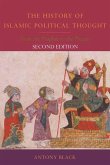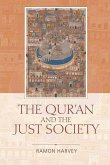166,99 €
inkl. MwSt.
Versandkostenfrei*
Liefertermin unbestimmt
Melden Sie sich
hier
hier
für den Produktalarm an, um über die Verfügbarkeit des Produkts informiert zu werden.
oder sofort lesen als eBook

83 °P sammeln
- Gebundenes Buch
Second edition of the history of Islamic political thought that traces its roots from early Islam to the current age of Fundamentalism (622 AD to 2010 AD).
Andere Kunden interessierten sich auch für
![The History of Islamic Political Thought The History of Islamic Political Thought]() Antony BlackThe History of Islamic Political Thought40,99 €
Antony BlackThe History of Islamic Political Thought40,99 €![Sharīʿa in the Russian Empire Sharīʿa in the Russian Empire]() Sharīʿa in the Russian Empire44,99 €
Sharīʿa in the Russian Empire44,99 €![The Qur'an and the Just Society The Qur'an and the Just Society]() Ramon HarveyThe Qur'an and the Just Society38,99 €
Ramon HarveyThe Qur'an and the Just Society38,99 €![The Communist Manifesto The Communist Manifesto]() Friedrich EngelsThe Communist Manifesto15,99 €
Friedrich EngelsThe Communist Manifesto15,99 €![The History of Political Thought The History of Political Thought]() Richard Whatmore (Professor of Modern History and Co- Director of tThe History of Political Thought17,99 €
Richard Whatmore (Professor of Modern History and Co- Director of tThe History of Political Thought17,99 €![Shariah Shariah]() Abdur Rashid SiddiquiShariah14,99 €
Abdur Rashid SiddiquiShariah14,99 €![Islamic Law and International Law Islamic Law and International Law]() Emilia Justyna PowellIslamic Law and International Law120,99 €
Emilia Justyna PowellIslamic Law and International Law120,99 €-
-
-
Second edition of the history of Islamic political thought that traces its roots from early Islam to the current age of Fundamentalism (622 AD to 2010 AD).
Hinweis: Dieser Artikel kann nur an eine deutsche Lieferadresse ausgeliefert werden.
Hinweis: Dieser Artikel kann nur an eine deutsche Lieferadresse ausgeliefert werden.
Produktdetails
- Produktdetails
- Verlag: Edinburgh University Press
- 2 Revised edition
- Seitenzahl: 400
- Erscheinungstermin: 19. Juli 2011
- Englisch
- Abmessung: 254mm x 179mm x 30mm
- Gewicht: 768g
- ISBN-13: 9780748639861
- ISBN-10: 0748639861
- Artikelnr.: 33768752
- Herstellerkennzeichnung
- Libri GmbH
- Europaallee 1
- 36244 Bad Hersfeld
- gpsr@libri.de
- Verlag: Edinburgh University Press
- 2 Revised edition
- Seitenzahl: 400
- Erscheinungstermin: 19. Juli 2011
- Englisch
- Abmessung: 254mm x 179mm x 30mm
- Gewicht: 768g
- ISBN-13: 9780748639861
- ISBN-10: 0748639861
- Artikelnr.: 33768752
- Herstellerkennzeichnung
- Libri GmbH
- Europaallee 1
- 36244 Bad Hersfeld
- gpsr@libri.de
Professor Antony Black lectured in Politics at University of Dundee from 1963 until retirement in 2000, covering most aspects of political theory from Plato to contemporary international relations and social philosophy. He has researched and published on a wide range of topics, from medieval ecclesiastical theories to contemporary political philosophy. 1975-76: Visiting associate professor, School of Government and Public Administration, The American University, Washington DC, USA. 1980-81: Senior Research Fellow, Nuffield Foundation, UK. March-April 1993: Visiting Professor, Faculty of Jurisprudence, University of Trento, Italy. 1993-7: Head of the Department of Politics, University of Dundee, UK. 1995-9 Book Review Editor of Early Modern History: Contacts, Contrasts and Comparisons (Brill).
Map
Time Chart
Introduction
Part I: The Messenger and the Law c.622-1000
1. The Mission of Muhammad
2. The Idea of Monarchy under the Umayyads and `Abbasids c.661-850
3. The Formation of the Shari'a
4. Shi'ism
5. The Restoration of Persia c.850-1050
6. Knowledge and Power: Philosophy without the Polis
Part II: Religion and State Power (din wa dawla): Sunni Doctrine & the State c.900-1220
7. The Theory of the Caliphate
8. State and Religion under the Saljuqs
9. Al-Ghazali: Mysticism and Politics
10. The Ethics of Power: Advice-to-Kings (nasihat al-muluk)
11. Ibn Rushd
12. The Politics of Sufism
Part III: The Shari`a and the Sword c.1220-1500
13. The Rape of Asia
14. Mamluk Ideology and the Sultan-Caliph
15. Nasir al-Din Tusi (1201-74): Social Philosophy and Status Groups
16. Ibn Taymiyya (1263-1328): Shari`a Governance (al-siyasa al-shari`yya)
17. The Delhi Sultanate and al-Barani: Statecraft and Morality
18. Ibn Khaldun (1332-1406): The Science of Civilization and the Governance of Islam
19. The Decline of Classical Islamic Political Thought
Part IV: Religious Ideology and Political Control in Early Modern States
20. A New World Order
21. The State of the House of Osman (devlet-i al-i Osman)
22. The Safavids
23. India and the Mughals
24. The Decline and Reform of the Ottoman Empire
Part V: Islam and the West
25. Modernism from the Ottoman Reforms to the Turkish Revolution
26. Conservatism and Modernism in Iran
27. Islamism
28. Islamism, Reformism and the Secular State
Conclusion
Glossary
Bibliography
Index.
Time Chart
Introduction
Part I: The Messenger and the Law c.622-1000
1. The Mission of Muhammad
2. The Idea of Monarchy under the Umayyads and `Abbasids c.661-850
3. The Formation of the Shari'a
4. Shi'ism
5. The Restoration of Persia c.850-1050
6. Knowledge and Power: Philosophy without the Polis
Part II: Religion and State Power (din wa dawla): Sunni Doctrine & the State c.900-1220
7. The Theory of the Caliphate
8. State and Religion under the Saljuqs
9. Al-Ghazali: Mysticism and Politics
10. The Ethics of Power: Advice-to-Kings (nasihat al-muluk)
11. Ibn Rushd
12. The Politics of Sufism
Part III: The Shari`a and the Sword c.1220-1500
13. The Rape of Asia
14. Mamluk Ideology and the Sultan-Caliph
15. Nasir al-Din Tusi (1201-74): Social Philosophy and Status Groups
16. Ibn Taymiyya (1263-1328): Shari`a Governance (al-siyasa al-shari`yya)
17. The Delhi Sultanate and al-Barani: Statecraft and Morality
18. Ibn Khaldun (1332-1406): The Science of Civilization and the Governance of Islam
19. The Decline of Classical Islamic Political Thought
Part IV: Religious Ideology and Political Control in Early Modern States
20. A New World Order
21. The State of the House of Osman (devlet-i al-i Osman)
22. The Safavids
23. India and the Mughals
24. The Decline and Reform of the Ottoman Empire
Part V: Islam and the West
25. Modernism from the Ottoman Reforms to the Turkish Revolution
26. Conservatism and Modernism in Iran
27. Islamism
28. Islamism, Reformism and the Secular State
Conclusion
Glossary
Bibliography
Index.
Map
Time Chart
Introduction
Part I: The Messenger and the Law c.622-1000
1. The Mission of Muhammad
2. The Idea of Monarchy under the Umayyads and `Abbasids c.661-850
3. The Formation of the Shari'a
4. Shi'ism
5. The Restoration of Persia c.850-1050
6. Knowledge and Power: Philosophy without the Polis
Part II: Religion and State Power (din wa dawla): Sunni Doctrine & the State c.900-1220
7. The Theory of the Caliphate
8. State and Religion under the Saljuqs
9. Al-Ghazali: Mysticism and Politics
10. The Ethics of Power: Advice-to-Kings (nasihat al-muluk)
11. Ibn Rushd
12. The Politics of Sufism
Part III: The Shari`a and the Sword c.1220-1500
13. The Rape of Asia
14. Mamluk Ideology and the Sultan-Caliph
15. Nasir al-Din Tusi (1201-74): Social Philosophy and Status Groups
16. Ibn Taymiyya (1263-1328): Shari`a Governance (al-siyasa al-shari`yya)
17. The Delhi Sultanate and al-Barani: Statecraft and Morality
18. Ibn Khaldun (1332-1406): The Science of Civilization and the Governance of Islam
19. The Decline of Classical Islamic Political Thought
Part IV: Religious Ideology and Political Control in Early Modern States
20. A New World Order
21. The State of the House of Osman (devlet-i al-i Osman)
22. The Safavids
23. India and the Mughals
24. The Decline and Reform of the Ottoman Empire
Part V: Islam and the West
25. Modernism from the Ottoman Reforms to the Turkish Revolution
26. Conservatism and Modernism in Iran
27. Islamism
28. Islamism, Reformism and the Secular State
Conclusion
Glossary
Bibliography
Index.
Time Chart
Introduction
Part I: The Messenger and the Law c.622-1000
1. The Mission of Muhammad
2. The Idea of Monarchy under the Umayyads and `Abbasids c.661-850
3. The Formation of the Shari'a
4. Shi'ism
5. The Restoration of Persia c.850-1050
6. Knowledge and Power: Philosophy without the Polis
Part II: Religion and State Power (din wa dawla): Sunni Doctrine & the State c.900-1220
7. The Theory of the Caliphate
8. State and Religion under the Saljuqs
9. Al-Ghazali: Mysticism and Politics
10. The Ethics of Power: Advice-to-Kings (nasihat al-muluk)
11. Ibn Rushd
12. The Politics of Sufism
Part III: The Shari`a and the Sword c.1220-1500
13. The Rape of Asia
14. Mamluk Ideology and the Sultan-Caliph
15. Nasir al-Din Tusi (1201-74): Social Philosophy and Status Groups
16. Ibn Taymiyya (1263-1328): Shari`a Governance (al-siyasa al-shari`yya)
17. The Delhi Sultanate and al-Barani: Statecraft and Morality
18. Ibn Khaldun (1332-1406): The Science of Civilization and the Governance of Islam
19. The Decline of Classical Islamic Political Thought
Part IV: Religious Ideology and Political Control in Early Modern States
20. A New World Order
21. The State of the House of Osman (devlet-i al-i Osman)
22. The Safavids
23. India and the Mughals
24. The Decline and Reform of the Ottoman Empire
Part V: Islam and the West
25. Modernism from the Ottoman Reforms to the Turkish Revolution
26. Conservatism and Modernism in Iran
27. Islamism
28. Islamism, Reformism and the Secular State
Conclusion
Glossary
Bibliography
Index.







